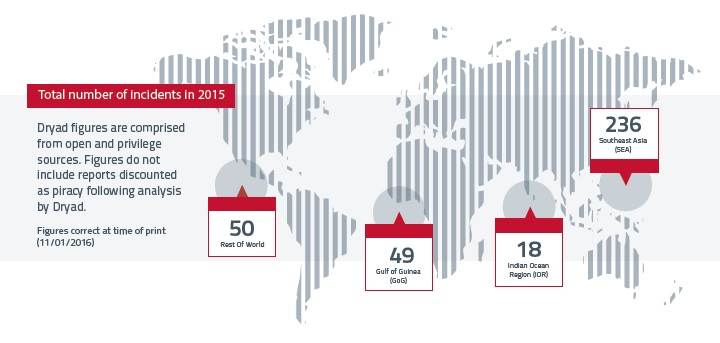Dryad Maritime has released its analysis of worldwide reported incidents of piracy and crime against mariners for 2015. Providing commentary on maritime piracy and crime around the world, the conflict in Yemen and Libya, and the migrant crisis in the Mediterranean; the report outlines the diverse and complex threats that shipping companies and mariners face.
Dryad’s latest figures show that Southeast Asia continues to dominate maritime crime incidents globally, with 236 reports of piracy and maritime crime instances occurring in the region since 1st January 2015, an increase of 10% compared to 2014. Of these reported incidents, Dryad recorded 106 reports of incidents in the Singapore Strait during 2015, an increase of 72% from 2014.
The Somali threat in the Indian Ocean remains contained with no confirmed attacks of merchant ships and the announcement in October of a reduction of the High Risk Area (HRA) inside of the UKMTO’s Voluntary Reporting Area (VRA) reflects this. The detention of 3 Iranian fishing vessels shows the continued resentment local fishermen have towards those engaged in Illegal Unreported and Unregulated (IUU) fishing, however, and highlights the need for continued caution in the area.
Ian Millen, Chief Operating Officer, Dryad Maritime;
“Piracy, maritime crime, terrorism, civil war and humanitarian crisis have combined to paint a picture of a complex, uncertain, and sometimes dangerous world. We have seen good news in some areas, including those which have given the shipping industry and its seafarers the most cause for concern in recent years, whilst in others we have seen the emergence of new threats.”
“With no confirmed attacks on large merchant vessels in the Indian Ocean’s High Risk Area during 2015, we may have seen a potential tipping point in maritime security terms. With the welcome reduction of the BIMCO-sponsored High Risk Area (HRA), we have the first real signs of optimism towards a time when the temporary and exceptional embarkation of armed guards may come to an end. We are not there yet; armed guards have, and continue to, make a significant contribution in reducing risk in some areas. Nevertheless, whilst the medicine is working, we can at least look forward to a future change of prescription.”
Source: Dryad Maritime





























































